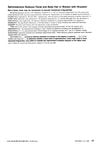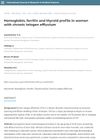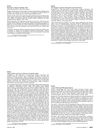 2 citations,
September 2019 in “Acta Cardiologica”
2 citations,
September 2019 in “Acta Cardiologica” Women with non-classic congenital adrenal hyperplasia have higher risk for heart and metabolic problems.
 83 citations,
April 1992 in “Clinical Endocrinology”
83 citations,
April 1992 in “Clinical Endocrinology” Having enough iron improves the effectiveness of a specific hair loss treatment in women.
 108 citations,
January 2003 in “Fertility and Sterility”
108 citations,
January 2003 in “Fertility and Sterility” Flutamide may slightly improve hair loss in women, but finasteride does not work.
 October 1986 in “Inpharma”
October 1986 in “Inpharma” Spironolactone helps reduce hair growth in women with hirsutism but may cause menstrual irregularities.
May 2021 in “Journal of the Endocrine Society” Female pattern hair loss severity is linked to physical signs of high androgens, not blood hormone levels.
1 citations,
November 2020 in “Cureus” Clinical signs of hyperandrogenism are related to female pattern hair loss severity, but biochemical markers are not.
 January 2016 in “International Journal of Research in Medical Sciences”
January 2016 in “International Journal of Research in Medical Sciences” Low iron, low thyroid function, and stress are linked to excessive hair shedding in women.
 52 citations,
November 2009 in “International journal of gynaecology and obstetrics”
52 citations,
November 2009 in “International journal of gynaecology and obstetrics” High androgen levels in Chinese women with PCOS are linked to a higher risk of diabetes and obesity.
 September 2021 in “Journal of the Egyptian Women's Dermatologic Society (Print)”
September 2021 in “Journal of the Egyptian Women's Dermatologic Society (Print)” The study concluded that low iron and vitamin D levels in women might play a role in chronic hair loss, despite no significant difference between those with and without hair loss.
 88 citations,
June 2016 in “Human Reproduction Update”
88 citations,
June 2016 in “Human Reproduction Update” New hormonal contraceptives are safer, have fewer side effects, and offer health benefits for women.
 93 citations,
June 2001 in “The Journal of Clinical Endocrinology and Metabolism”
93 citations,
June 2001 in “The Journal of Clinical Endocrinology and Metabolism” Certain genetic variations in the AR and ERβ genes can affect androgen levels in women.
 3 citations,
October 2022 in “International Journal of Impotence Research”
3 citations,
October 2022 in “International Journal of Impotence Research” Testosterone Replacement Therapy can improve sexual health in postmenopausal women with low sexual desire, but more research is needed on its long-term effects.
 1 citations,
September 2021 in “CRC Press eBooks”
1 citations,
September 2021 in “CRC Press eBooks” Frontal Fibrosing Alopecia is a hair loss condition mainly affecting postmenopausal women, with unclear causes and various clinical patterns.
 4 citations,
January 2012 in “Journal of the Egyptian Women's Dermatologic Society (Print)”
4 citations,
January 2012 in “Journal of the Egyptian Women's Dermatologic Society (Print)” Women with female pattern hair loss may have a higher risk of developing metabolic syndrome.
 June 2023 in “Faculty Opinions – Post-Publication Peer Review of the Biomedical Literature”
June 2023 in “Faculty Opinions – Post-Publication Peer Review of the Biomedical Literature” Bicalutamide mesotherapy improved hair density in women with hair loss and was well received.
 28 citations,
February 2011 in “Clinical Endocrinology”
28 citations,
February 2011 in “Clinical Endocrinology” Women with PCOS have unhealthy changes in their cholesterol particles that are not related to their body weight.
 74 citations,
July 2010 in “The Journal of Clinical Endocrinology & Metabolism”
74 citations,
July 2010 in “The Journal of Clinical Endocrinology & Metabolism” Treatment of acromegaly can improve women's reproductive health issues caused by hormonal imbalances or tumors.
 1 citations,
May 2013 in “Journal of the Egyptian Women's Dermatologic Society (Print)”
1 citations,
May 2013 in “Journal of the Egyptian Women's Dermatologic Society (Print)” PSA could be a marker for hyperandrogenism in women, but more research is needed.
 2 citations,
April 2022 in “African Health Sciences”
2 citations,
April 2022 in “African Health Sciences” The Fatty Liver Index (FLI) may not be enough to rule out non-alcoholic fatty liver disease in lean women with polycystic ovary syndrome.

Isotretinoin may cause temporary, reversible facial hair growth in some women.
 32 citations,
January 1990 in “Clinical Endocrinology”
32 citations,
January 1990 in “Clinical Endocrinology” Women with female pattern hair loss have higher levels of certain androgens, suggesting increased androgen exposure to hair follicles.
 23 citations,
April 2021 in “Journal of Clinical Medicine”
23 citations,
April 2021 in “Journal of Clinical Medicine” Frontal Fibrosing Alopecia's cause is unclear, affects mainly postmenopausal women, and current treatments focus on stopping hair loss rather than regrowth.

The main cause of hirsutism in Algerian women is polycystic ovary syndrome, and those affected should be checked for related hormonal issues.
 August 2023 in “Tzu Chi Medical Journal”
August 2023 in “Tzu Chi Medical Journal” Iron deficiency is the main cause of hair loss in women, and iron supplements started within 6 months can improve hair health.
 July 2018 in “Journal of College of Medical Sciences-nepal”
July 2018 in “Journal of College of Medical Sciences-nepal” Women with certain types of hair loss may have low iron levels.
 July 2018 in “Elsevier eBooks”
July 2018 in “Elsevier eBooks” Frontal Fibrosing Alopecia is a type of hair loss affecting mostly older women, with no agreed best treatment.
 1 citations,
May 2017 in “Maturitas”
1 citations,
May 2017 in “Maturitas” The document concludes that managing health issues like menopause, cardiovascular risk, and hair loss is crucial for promoting longevity in aging women.
March 2023 in “Pakistan Journal of Medical and Health Sciences” Low vitamin D levels are linked to higher rates of hair loss in women.
9 citations,
March 2008 in “PubMed” Low estrogen compared to androgen may cause female hair loss.
 7 citations,
June 1994 in “Journal of The American Academy of Dermatology”
7 citations,
June 1994 in “Journal of The American Academy of Dermatology” Obesity may contribute to female hair loss by increasing male hormone levels that affect hair follicles.


























